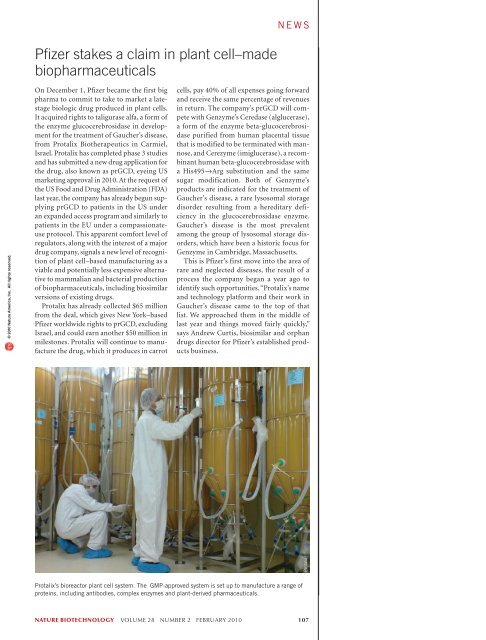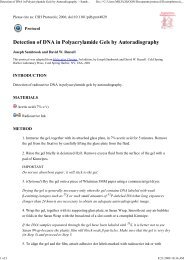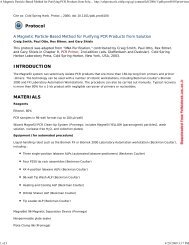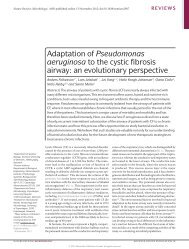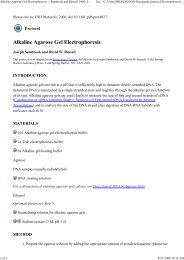NEWS© 2010 Nature America, Inc. All rights reserved.TysabriapprovedTysabri goes back on the marketmid-year, with new safety andreporting measures in placeis now working on PML. Biogen’s scientistshave already developed an assay that identifiescarriers of JC virus. It is estimated thatupwards of 50% of people are infected withthis opportunistic virus, which mostly lieslatent indefinitely. PML is extremely rare inanyone but those with impaired immunesystems, such as people with AIDS, B-cellmalignancies or systemic lupus erythematosus(SLE). Once JC virus is activated itinfiltrates the central nervous system (CNS),causing neurobehavioral symptoms, whichcan become life threatening. Fortunately,Tysabri’s effects are rapidly reversible, soif patients at risk of PML can be identified,their normal immune function can quicklybe restored and most patients recover.The assay Biogen has developed “only tellsyou whether the person has been infected ornot,” says Yednock. “We also need to be ableto tell the level of viral replication or whetherit has transitioned from latent to activatedvirus [capable of infecting brain cells].”“This is such a ubiquitous virus, somethingmust happen to enable it to grow in glialcells,” says Joseph Berger of the Departmentof Neurology at the University of KentuckyCollege of Medicine.One line of research has suggested that thestructure of Tysabri itself might be to blame.Researchers at Genmab in Copenhagen havereported that IgG4 antibodies like Tysabri,which are bi specific and contain a flimsybackbone, can exchange the Fab-arm portionof the antibody with endogenous IgG4s withthe wrong specificity (Nat. Biotechnol. 27,767–771, 2009). If Tysabri molecules recombinedwith endogenously produced anti–JCvirus antibodies, the researchers postulated,the resultant bispecific mAb might capturethe virus and carry it into the CNS.Scientists at PanGenetics in Utrecht, TheNetherlands, who have an IgG4 mAb inRaptiva is voluntarily withdrawnby Genentech in June, after fourconfirmed PML cases andthree deaths2004 2005200620072008 2009Tysabri pulled fromthe market after twoPML cases identifiedFigure 1 Timeline for the reintroduction of Tysabri and PML cases.“Dear Doctor” letter warns thatpatients on Rituxan are at anincreased risk of developing PML.EMA begins a new reviewof TysabriJunePML cases are confirmedin patients takingRituxan and RaptivaOctoberdevelopment, have challenged this theory,pointing out that clinical data suggest there isvery little circulating JC virus to be capturedand no mechanism by which Tysabri couldtransport virus into the CNS (see p. 123;SciBX 2(32); doi:10.1038/scibx.2009.1231).Also, mAbs are not the only drugs that cancause PML. Basel-based Roche’s CellCept(mycophenolate mofetil, which targetsinosine monophosphate dehydrogenase 1),for example, has also been linked to the disease.Most experts appear to be leaning towardother theories. Recent studies suggestthe antibodies can specifically affect themovement of mature and immature lymphocytesin the body. By binding VLA-4,Tysabri prevents lymphocytes from bindingto the vascular cell adhesion molecule-1(VCAM-1), and if hematopoietic stem cellsand pre-B cells are unable to bind VCAM-1, they migrate out from the bone marrow.“We have plenty of data now that showthese progenitor cells are found at higherthan normal rates in the peripheral systemin patients on this drug,” says Gene Majorof the Laboratory of Molecular Medicineand Neuroscience at the National Instituteof Neurological Discoveries and Stroke inBethesda, Maryland. Some of these B cellscontain JC virus that may replicate promptedby DNA-binding proteins (New Engl. J. Med.361, 1041–1043, 2009). This mechanismcould also explain how Rituxan can causePML because this mAb reduces the numberof CD20 + B cells in peripheral blood, whichalso stimulates the release of progenitor cellsfrom the marrow.It is also thought that Tysabri limits thepassage of cytotoxic T cells into the brainbecause they need to bind VCAM-1 tomigrate out of the circulation. Because theseare precisely the cells that would defendagainst the JC virus, the drug could be handicappingpatients’ native immune defense.In the meantime, regulators are keepinga close eye on Tysabri and Rituxan.The European Medicines Agency (EMA)was reviewing the data about Tysabri andPML as Nature Biotechnology went to press.Crystal Rice, an FDA spokesperson, wrotein an e-mail, “We have been receiving andcontinue to receive reports of PML cases inreal time, are monitoring the incidence ofPML both in the United States and worldwideon an ongoing basis, and are continuingto assess the issue to determine the need forfurther regulatory action.”With Tysabri, risk of PML has currentlybeen calculated at one in a thousand, butthat could change as more people take thedrug for extended periods. For Rituxan, thepicture is less clear. PML occurs in rheumatoidarthritis and SLE patients sometimeseven when they are not taking Rituxan. “It’snot clear how much additional risk Rituxanimparts,” says Leonard H. Calabrese ofthe Cleveland Clinic in Cleveland. On thebasis of current data, he believes the risk isso low the number is not even calculable.Nonetheless, rheumatologists are very concernedabout PML. Calabrese says he andcolleagues recently conducted a survey andfound that “the level of concern doesn’tcoincide with the available risk data.” Manyarthritis drugs, he points out, have seriouspotential side effects. But with Rituxan andPML, “there is a disconnect between knowledgeand fear.”It’s also unclear whether other immunemodulatingdrugs that mobilize hematopoieticstem cells and pre-B cells may encounterproblems similar to those Tysabri and Rituxanhave. Copenhagen-based Genmab’s Arzerra(ofatumumab), approved in October forchronic lymphocytic leukemia, Genentech’socrelizumab (in late-stage trials for rheumatoidarthritis and SLE) and Biolex’s BIX-301non-Hodgkin’s B cell lymphoma, all targetCD20. As yet, there are no reports of PMLcases associated with these drugs.“We are perturbing very specific arms ofa highly complex system,” Berger says. Thatpower can clearly backfire if you don’t knowall the drug’s effects. As a result, Biogen’sSandrock expects risk management plansare “here to stay.” Berger says he’s been tryingto convince drug companies to establishregistries for drugs with novel mechanisms.“As a community, we need to be preparedto identify these problems as they arise,” hesays.Malorye Allison Acton, Massachusetts106 volume 28 number 2 february 2010 nature biotechnology
newsPfizer stakes a claim in plant cell–madebiopharmaceuticals© 2010 Nature America, Inc. All rights reserved.On December 1, Pfizer became the first bigpharma to commit to take to market a latestagebiologic drug produced in plant cells.It acquired rights to taligurase alfa, a form ofthe enzyme glucocerebrosidase in developmentfor the treatment of Gaucher’s disease,from Protalix Biotherapeutics in Carmiel,Israel. Protalix has completed phase 3 studiesand has submitted a new drug application forthe drug, also known as prGCD, eyeing USmarketing approval in 2010. At the request ofthe US Food and Drug Administration (FDA)last year, the company has already begun supplyingprGCD to patients in the US underan expanded access program and similarly topatients in the EU under a compassionateuseprotocol. This apparent comfort level ofregulators, along with the interest of a majordrug company, signals a new level of recognitionof plant cell–based manufacturing as aviable and potentially less expensive alternativeto mammalian and bacterial productionof biopharmaceuticals, including biosimilarversions of existing drugs.Protalix has already collected $65 millionfrom the deal, which gives New York–basedPfizer worldwide rights to prGCD, excludingIsrael, and could earn another $50 million inmilestones. Protalix will continue to manufacturethe drug, which it produces in carrotcells, pay 40% of all expenses going forwardand receive the same percentage of revenuesin return. The company’s prGCD will competewith Genzyme’s Ceredase (alglucerase),a form of the enzyme beta-glucocerebrosidasepurified from human placental tissuethat is modified to be terminated with mannose,and Cerezyme (imiglucerase), a recombinanthuman beta-glucocerebrosidase witha His495→Arg substitution and the samesugar modification. Both of Genzyme’sproducts are indicated for the treatment ofGaucher’s disease, a rare lysosomal storagedisorder resulting from a hereditary deficiencyin the glucocerebrosidase enzyme.Gaucher’s disease is the most prevalentamong the group of lysosomal storage disorders,which have been a historic focus forGenzyme in Cambridge, Massachusetts.This is Pfizer’s first move into the area ofrare and neglected diseases, the result of aprocess the company began a year ago toidentify such opportunities. “Protalix’s nameand technology platform and their work inGaucher’s disease came to the top of thatlist. We approached them in the middle oflast year and things moved fairly quickly,”says Andrew Curtis, biosimilar and orphandrugs director for Pfizer’s established productsbusiness.ProtalixProtalix’s bioreactor plant cell system. The GMP-approved system is set up to manufacture a range ofproteins, including antibodies, complex enzymes and plant-derived pharmaceuticals.nature biotechnology volume 28 number 2 february 2010 107
- Page 3 and 4: volume 28 number 2 february 2010COM
- Page 5 and 6: in this issue© 2010 Nature America
- Page 7 and 8: © 2010 Nature America, Inc. All ri
- Page 12 and 13: NEWS© 2010 Nature America, Inc. Al
- Page 14 and 15: NEWS© 2010 Nature America, Inc. Al
- Page 16 and 17: © 2010 Nature America, Inc. All ri
- Page 18 and 19: © 2010 Nature America, Inc. All ri
- Page 20 and 21: © 2010 Nature America, Inc. All ri
- Page 22 and 23: NEWS feature© 2010 Nature America,
- Page 24 and 25: uilding a businessComing to termsDa
- Page 26 and 27: uilding a business© 2010 Nature Am
- Page 28 and 29: correspondence© 2010 Nature Americ
- Page 30 and 31: correspondence© 2010 Nature Americ
- Page 32 and 33: correspondence© 2010 Nature Americ
- Page 34 and 35: correspondence© 2010 Nature Americ
- Page 36 and 37: case studyNever againcommentaryChri
- Page 38 and 39: COMMENTARY© 2010 Nature America, I
- Page 40 and 41: COMMENTARY© 2010 Nature America, I
- Page 42 and 43: patents© 2010 Nature America, Inc.
- Page 44 and 45: patents© 2010 Nature America, Inc.
- Page 46 and 47: news and viewsChIPs and regulatory
- Page 48 and 49: news and viewsFrom genomics to crop
- Page 50 and 51: news and views© 2010 Nature Americ
- Page 52 and 53: news and views© 2010 Nature Americ
- Page 54 and 55: e s o u r c eRational association o
- Page 56 and 57: e s o u r c e© 2010 Nature America
- Page 58 and 59: e s o u r c e© 2010 Nature America
- Page 60 and 61:
e s o u r c e© 2010 Nature America
- Page 62 and 63:
© 2010 Nature America, Inc. All ri
- Page 64 and 65:
B r i e f c o m m u n i c at i o n
- Page 66 and 67:
i e f c o m m u n i c at i o n sAUT
- Page 68 and 69:
lettersa1.5 kb hVPrIntron 112.5 kbA
- Page 70 and 71:
letters© 2010 Nature America, Inc.
- Page 72 and 73:
letters© 2010 Nature America, Inc.
- Page 74 and 75:
l e t t e r sReal-time imaging of h
- Page 76 and 77:
l e t t e r sFigure 2 Time-lapse li
- Page 78 and 79:
l e t t e r s© 2010 Nature America
- Page 80 and 81:
l e t t e r sRational design of cat
- Page 82 and 83:
l e t t e r s© 2010 Nature America
- Page 84 and 85:
l e t t e r s© 2010 Nature America
- Page 86 and 87:
sample fluorescence was measured as
- Page 88 and 89:
careers and recruitmentFourth quart


